Undergraduate Course : Department Details
Academics
Life Science and Applied Chemistry
- Life and Materials Chemistry
- Soft Materials
- Advanced Ceramics
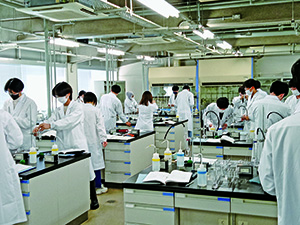
The objective of this Department is to cultivate engineers with basic knowledge and skills in chemistry as applicable to environmental and energy problems, and other important issues.
Students will acquire knowledge enabling them to understand molecular design, organic and inorganic syntheses, elucidation of life phenomena, polymer materials, ceramics, material properties evaluation, analytical techniques, structural analysis, theoretical calculation, physical chemical phenomena, and process design. They will also gain the knowledge and skills to develop new materials, and the elucidation and regeneration of biological functions.
Life Science and Applied Chemistry
Physical Science and Engineering
- Materials Function and Design
- Applied Physics

This Department encompasses the creation of new simulation analyses and nano-scale measurement techniques and the design and development of
innovative functional materials to support industrial development and the realization of a sustainable society. The integration of the scientific fields, "Materials Function and Design" and "Applied Physics", is important to cultivate human resources with advanced knowledge and skills in materials creation and physical properties analysis.
Physical Science and Engineering
Electrical and Mechanical Engineering
- Electrical and Electronic Engineering
- Mechanical Engineering
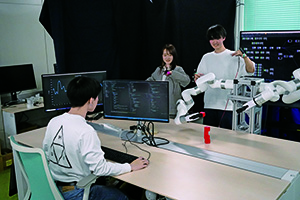
Many engineering products in our daily lives, such as automobiles, trains and electronic devices are designed by integrating electrical, electronic and mechanical systems. The unique feature of our program department is to provide our students many chances to learn a wide range of knowledge in Electrical and Electronic Engineering and Mechanical Engineering. Our graduates, equipped with both basic and application skills, are able to become engineers in a broad area of industry, requiring the technologies to develop and manufacture the above engineering products.
Electrical and Mechanical Engineering
Computer Science
- Networks
- Computational Intelligence
- Multimedia and Human Computer Interaction
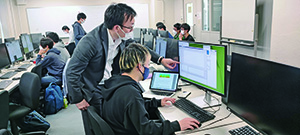
The Department of Computer Science offers attractive curricula in computer science and information technologies. We provide three fields. Each field consists of professional subjects in the form of lecture classes, training exercises and experiments. Before going on to the professional subjects, students learn basic subjects in the field such as programming, computer hardware and software, algorithms, information theory and mathematics.
Architecture, Civil Engineering, and Industrial Management Engineering
- Architecture and Design
- Civil and Environmental Engineering
- Systems Management and Engineering
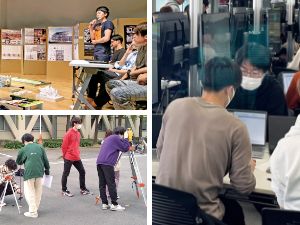
The objective of this department is to develop human resources with advanced engineering knowledge and practical ability to build a sustainable society, who can solve various issues concerning architecture, design, social infrastructure, land formation, environment, disaster prevention, management engineering, system management, and so forth. In order to achieve this goal, the department consists of the three fields: Architecture and Design,Civil and Environmental Engineering, and Systems Management and Engineering.
Architecture ,Civil Engineering, and Industrial Management Engineering
Creative Engineering Program
- Materials and Energy
- Computer and Social Engineering

The Creative Engineering Program was newly established in 2016 in order to train engineers and researchers who will change future industry and society through technology. This program serves as a six-year integrated undergraduate and graduate course, with a cross-sectorial curriculum covering the entire field of engineering, and various practical classes such as "Laboratory Rotation". Through these studies, students are expected to become comprehensive engineers with knowledge of engineering in a wide range of fields.
Fundamental Engineering Program(Evening Course)
- Electrical and Mechanical Engineering
- Civil and Environmental Engineering
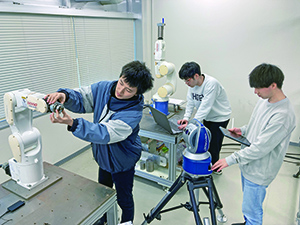
The Fundamental Engineering Program was established in 2022 as a five-year evening course to learn "Fundamental Engineering in Industry" related to electrical, mechanical, and civil engineering, which is especially in high demand by the industry in the Chukyo region. This program is divided into two courses: "Electrical and Mechanical Engineering course" and "Civil and Environment Engineering course". We are aiming to foster "creative engineers" who will be able to work at actual manufacturing and construction sites with practical knowledge and techniques. As a "Practical Engineering Education", we deliver Project-Based Learning (PBL) through internships at industry and collaboration between companies, professors, and students.

 Japanese
Japanese